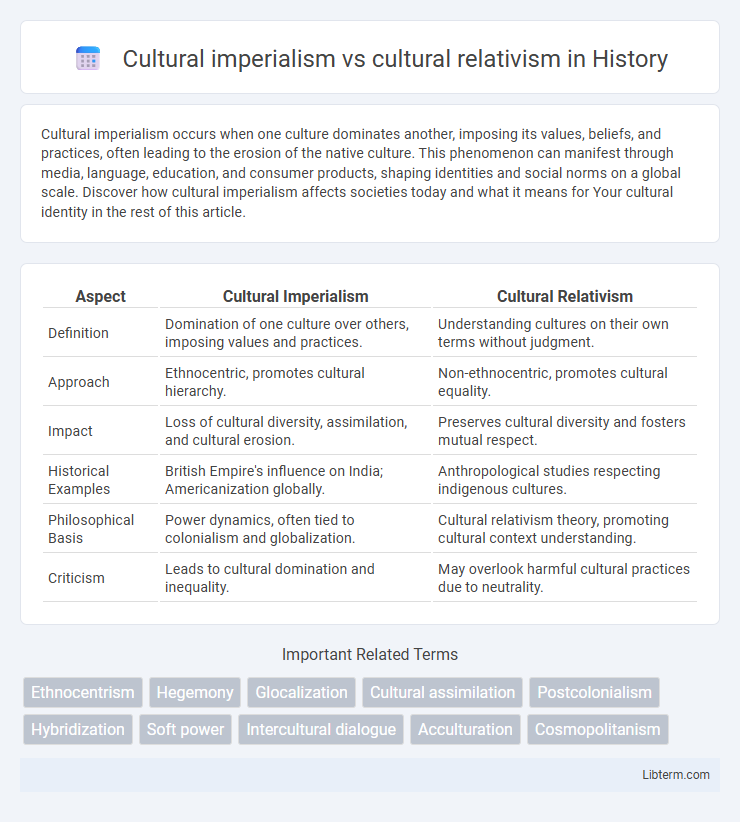Cultural imperialism occurs when one culture dominates another, imposing its values, beliefs, and practices, often leading to the erosion of the native culture. This phenomenon can manifest through media, language, education, and consumer products, shaping identities and social norms on a global scale. Discover how cultural imperialism affects societies today and what it means for Your cultural identity in the rest of this article.
Table of Comparison
| Aspect | Cultural Imperialism | Cultural Relativism |
|---|---|---|
| Definition | Domination of one culture over others, imposing values and practices. | Understanding cultures on their own terms without judgment. |
| Approach | Ethnocentric, promotes cultural hierarchy. | Non-ethnocentric, promotes cultural equality. |
| Impact | Loss of cultural diversity, assimilation, and cultural erosion. | Preserves cultural diversity and fosters mutual respect. |
| Historical Examples | British Empire's influence on India; Americanization globally. | Anthropological studies respecting indigenous cultures. |
| Philosophical Basis | Power dynamics, often tied to colonialism and globalization. | Cultural relativism theory, promoting cultural context understanding. |
| Criticism | Leads to cultural domination and inequality. | May overlook harmful cultural practices due to neutrality. |
Understanding Cultural Imperialism
Cultural imperialism refers to the dominance of one culture over others, often manifesting through the export of media, language, and values that can undermine local traditions and identities. It involves the imposition of cultural norms and practices by powerful societies, frequently linked to economic and political influence, which can lead to homogenization and loss of cultural diversity. Understanding cultural imperialism requires analyzing how global media corporations, multinational brands, and political agendas contribute to shaping cultural perceptions and consumer behavior worldwide.
Defining Cultural Relativism
Cultural relativism is the principle that an individual's beliefs and activities should be understood by others in terms of that person's own culture, emphasizing the importance of context in evaluating cultural practices. It opposes cultural imperialism, which imposes one culture's values and norms on others, often leading to ethnocentrism and cultural homogenization. By advocating for respect and tolerance toward cultural diversity, cultural relativism promotes an inclusive approach to global interactions and ethical judgments.
Historical Roots of Cultural Imperialism
Cultural imperialism traces its historical roots to colonial expansion during the 15th to 20th centuries when European powers imposed their languages, religions, and social norms on colonized regions across Africa, Asia, and the Americas. The transmission of Western education systems, media, and economic structures systematically displaced indigenous cultures, reinforcing a Eurocentric worldview that justified domination and cultural assimilation. This legacy continues to shape global power dynamics, influencing contemporary debates on cultural relativism, which advocates for understanding and respecting cultural diversity without imposing external values or judgments.
Key Principles of Cultural Relativism
Cultural relativism emphasizes understanding and evaluating cultural practices based on the context of the specific society, rather than imposing external standards. Key principles include recognizing cultural diversity, suspending ethnocentric judgment, and appreciating that moral values and social norms are culture-specific and not universally applicable. This approach promotes tolerance and deeper insight into different ways of life while challenging the dominance of cultural imperialism.
Impacts of Globalization on Local Cultures
Globalization accelerates cultural imperialism by spreading dominant cultures, often overshadowing and homogenizing local traditions, languages, and customs. Cultural relativism challenges this by promoting the understanding and respect of cultural differences, emphasizing the preservation of indigenous identities and practices. The tension between these forces influences social cohesion, cultural diversity, and the resilience of local communities in a globalized world.
Ethical Dilemmas: Universalism vs. Cultural Context
Ethical dilemmas in cultural imperialism versus cultural relativism center on the conflict between universalism, which asserts that certain moral principles apply globally, and cultural context, which emphasizes respecting diverse customs and values. Cultural imperialism risks imposing dominant cultural norms on others, potentially leading to ethical violations and loss of cultural identity. In contrast, cultural relativism advocates for ethical understanding within specific cultural frameworks, challenging the imposition of external standards and promoting respect for pluralism.
Media and the Spread of Cultural Norms
Media serves as a powerful vehicle for cultural imperialism by disseminating dominant cultural norms and values globally, often overshadowing local traditions and perspectives. Cultural relativism in media promotes the acceptance and representation of diverse cultural expressions, fostering mutual respect and understanding across societies. The tension between these two approaches shapes how cultural identities are constructed and perceived in the age of global communication.
Resistance and Adaptation to Cultural Imperialism
Resistance to cultural imperialism often manifests through the preservation of indigenous languages, traditions, and social norms that reject dominant foreign influences. Cultural relativism promotes the acceptance and adaptation of external cultural elements only insofar as they align with local values and social structures, enabling communities to selectively integrate or resist aspects of imposed cultures. This dynamic interaction between resistance and adaptation serves as a critical mechanism for marginalized societies to maintain cultural sovereignty and identity in the face of globalizing pressures.
Balancing Cultural Respect with Human Rights
Cultural imperialism often imposes dominant cultural values, risking the suppression of indigenous traditions and identities, while cultural relativism emphasizes understanding practices within their cultural context to avoid ethnocentrism. Balancing cultural respect with human rights requires recognizing universal human rights standards without dismissing cultural diversity, ensuring that fundamental freedoms are protected against harmful cultural practices. Effective policy frameworks promote dialogue and collaboration between global human rights institutions and local communities to achieve ethical coexistence.
The Future of Cultural Exchange and Identity
Cultural imperialism shapes global identity by imposing dominant cultural norms, often marginalizing local traditions and reducing cultural diversity. Embracing cultural relativism fosters mutual respect and understanding, allowing societies to engage in cultural exchange without bias or hierarchy. The future of cultural exchange and identity depends on balancing global interconnectedness with preserving unique cultural perspectives, ensuring inclusive and equitable dialogues.
Cultural imperialism Infographic

 libterm.com
libterm.com